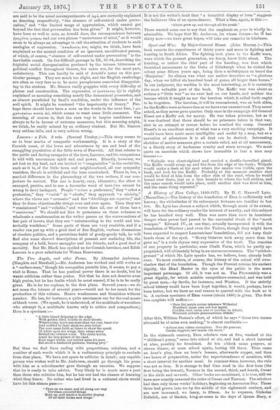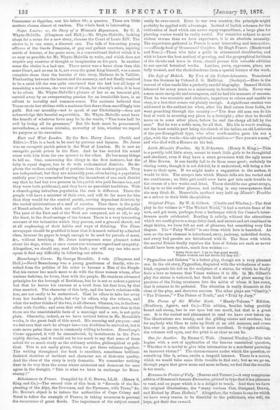A History of Eton College, 1410-1875. By H. C. Maxwell
Lyte. (Macmillan.)—The history of the foundation of Eton is sufficiently well known ; the vicissitudes of its subsequent fortunes are familiar to but few. Mr. Lyte has chosen a subject which, through much of its extent, will have for the ordinary reader the interest of novelty, and this subject he has handled very well. Eton was more than once in imminent danger when power had passed to the successful rivals of the "meek usurper." Edward IV., at one time, actually incorporated it with the foundation of Windsor ; and even the Tudors, though they might have been expected to respect Lancastrians' foundations, did not keep their hands clean of the spoil. "Henry Octavus took away more than he gave us," is a rude rhyme very expressive of the truth. The remains of one, property in particular, near Chalk Farm, which he partly ap- propriated, will ultimately bring in an enormous revenue. The "cricket-' ground" of which Mr. Lyte speaks has, we believe, been already built over. To most readers, of course, the history of the school will over- shadow that of the foundation. Though the Provost retains his ancient dignity, the Head Master in the eyes of the public is the more important personage. Of old, it was not so. The Provestship was a great dignity, for which notable competitors contended, and was held by great men,—by Savile, for instance, and Wootton. If the strictly school history could have been kept together, it would, perhaps, have been better, but we have no real reason to quarrel with the book as it is. A curious specimen of Eton verses (about 1480) is given. The first two couplets will suffice :— " Nate Del patris anime miserere Wilheiml Westburi, cujus ossa sub hoe lapide Condita sent, name ems et nutritus in Alford, Wiasonie juvenis grammatleam
After this, William Paston's effort, of which ho says " those two verses aforesaid be of mine own making," is almost creditable
Arbor° jam videos exemplum. Non die possuut, Omuta suppler!, sed lemon Ills more."
In the sixteenth century, Eton scholars rose at five, washed at the "children's pump," came into school at six, and had a short interval at nine, possibly for breakfast. At ten o'clock came prayers, at eleven dinner, at noon school again, lasting till three. Then camo an hour's play, then an hour's lessons, afterwards supper, and then two hours of preparation, under the superintendence of monitors, with a short interval for another meal. In summer-time, however, the rule was not so iron. It is strange to find Cato read in the first form (the first being the lowest), Terence in the second, third, and fourth, Crew in the sixth and seventh. Other books are mentioned, it is true, still we have now exactly reversed the order of Cassar and Terence. The scholars had then only three weeks' holidays, beginning on Ascension Day. These three had grown into ten by the middle of the eighteenth century, and are now increased, we fancy, to fifteen. As to expense, Nicholas Deltrick, son of Gaston, king-at-arms in the days of Queen Mary, a Commoner or Oppidan, cost his father Ng. a quarter. These are little matters chosen almost at random. The whole book is interesting.







































 Previous page
Previous page